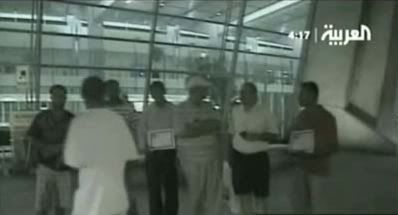 The Iraqi-Americans grounded for speaking Arabic on an American Airlines plane.
The Iraqi-Americans grounded for speaking Arabic on an American Airlines plane. Two of the six Iraqi-Americans on the American Airlines plane exhibiting "strange behavior."
Two of the six Iraqi-Americans on the American Airlines plane exhibiting "strange behavior."This story, at this time, strikes me as suspicious. Six years later and an American woman passenger, terrified by the Bush-Cheney renewed fear campaign, is able to ground a plane due to her own irrational fear and ignorance. To believe that this was on the level, you have to accept that after billions have been squandered not securing the homeland from terrorist attacks, the airlines still have no method for assuring the safety of airline travel and will ground a plane overnight, put all of the passengers up at hotels, because one woman was frightened because of Arabic speakers on her plane.
I'd like to know the identity of the woman who reported these men as exhibiting "strange behavior."
At a time when Bush-Cheney are racheting up the fear card again in order to pressure Congrees into supporting the continuation of the war in Iraq (and, according to the latest reports, expand it to Iran), it wouldn't surprise me to learn that the woman who complained was a Republican operative.
News.com.au reports:
An American Airlines flight from San Diego to Chicago was delayed when passengers complained about a group of Iraqi men speaking Arabic, US media reported today.
The flight was supposed to leave about 11pm on Tuesday when a woman boarding the plane complained about the other passengers, airline spokeswoman Mary Francis Fagan said.
The dispute delayed the plane which was then forced to cancel when it fell under the curfew at San Diego airport, Ms Fagan said, acccording to the Daily Herald online.
According to media reports, the woman complained because the men were speaking Arabic.
Irene McCormack, a spokeswoman for the San Diego Unified Port District said the woman expressed concerns to the flight crew before boarding that six men were speaking a foreign language and exhibiting “strange behaviour”.
The passenger continued telling the crew her concerns, within earshot of the men, after the jet taxied from the gate, Ms McCormack said yesterday.
She said the pilot decided to return to the gate and police were called.
An Associated Press report said the six Iraqi men had been training Marines at Camp Pendleton and worked for Defense Training Systems, a unit of International Logistics Services.
The six Iraqis had been training US Marines at Camp Pendleton and worked for Defence Training Systems, a unit of the Alaska-based International Logistics Services Corp, said the company's chief executive R David Stephens.
“They did nothing wrong,” he said.
A company news release called it “an unfortunate situation for all flight passengers.”
"We were hired for this Government. We can prove ourselves. We are good people, not a bad people," said one of the men involved, Dave Alwatan, who is a US citizen.
"How can we be bad if we are helping our people here - American people? Why are we getting treated like that?" he was quoted as saying by ABC7 Chicago.
All 126 passengers had to be acccommodated overnight and put on other flights on Wednesday.
Ahmed Rehab, executive director of the Council on American-Islamic Relations in Chicago, was upset about the airline's actions.
"It is one thing to flag suspicious behavior, but to flag a global language? We are deplaning people for who they are, not what they do," Mr Rehab said.
Perhaps the way to put an end to the Bush-Cheney fear campaign is for Americans to turn in Arab-speaking passengers on all domestic flights, and report that they are exhibiting "strange behavior."
If enough planes are grounded and travel was brought to a halt, maybe big business would pressure Bush-Cheney that it's time they stopped their nonsensical "war on terror" and get us back to a time of real life in the real world.



